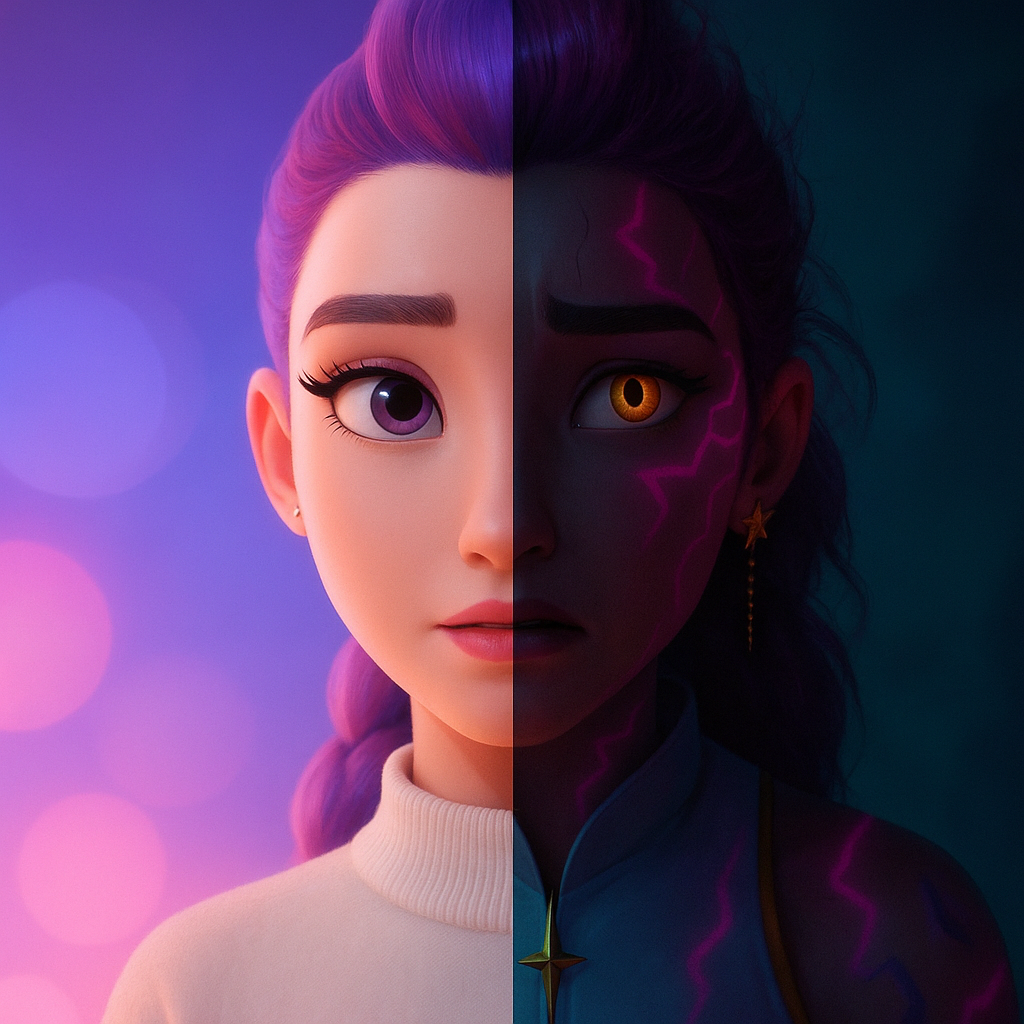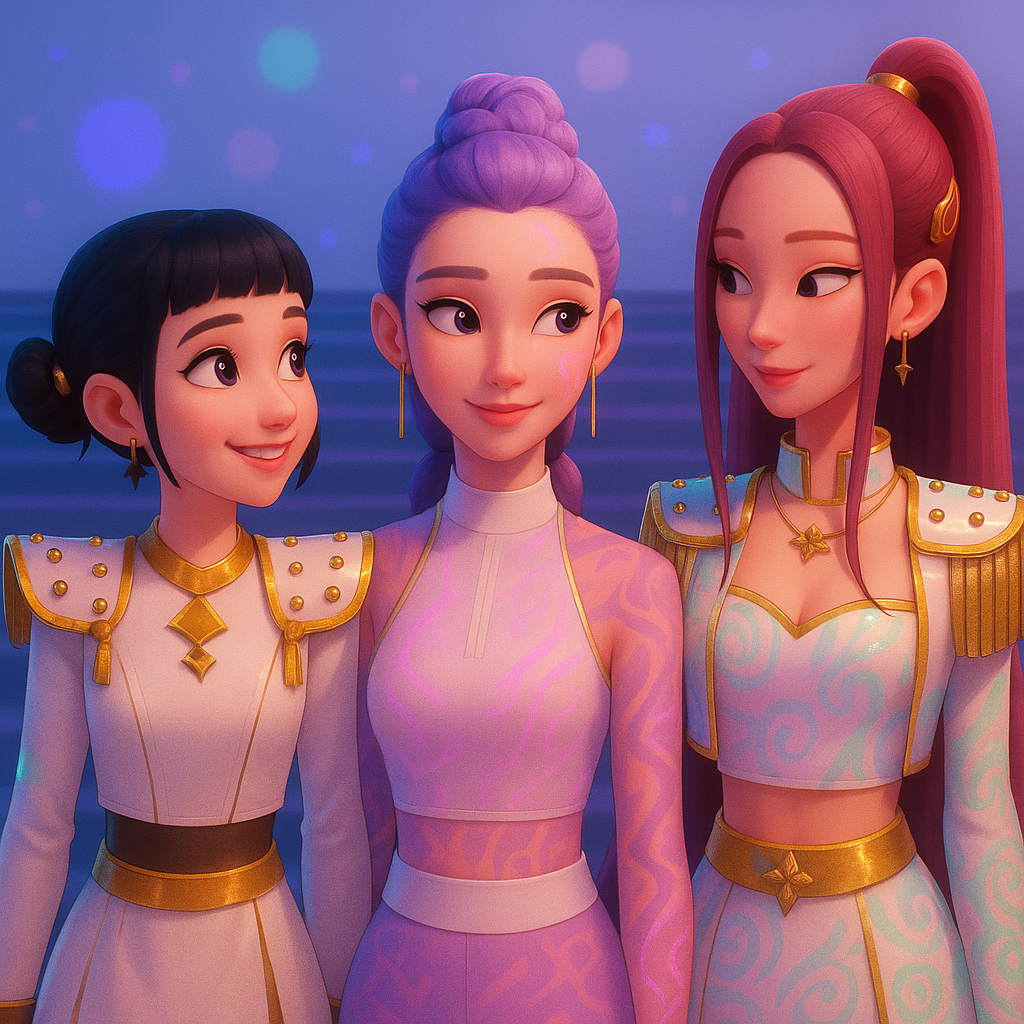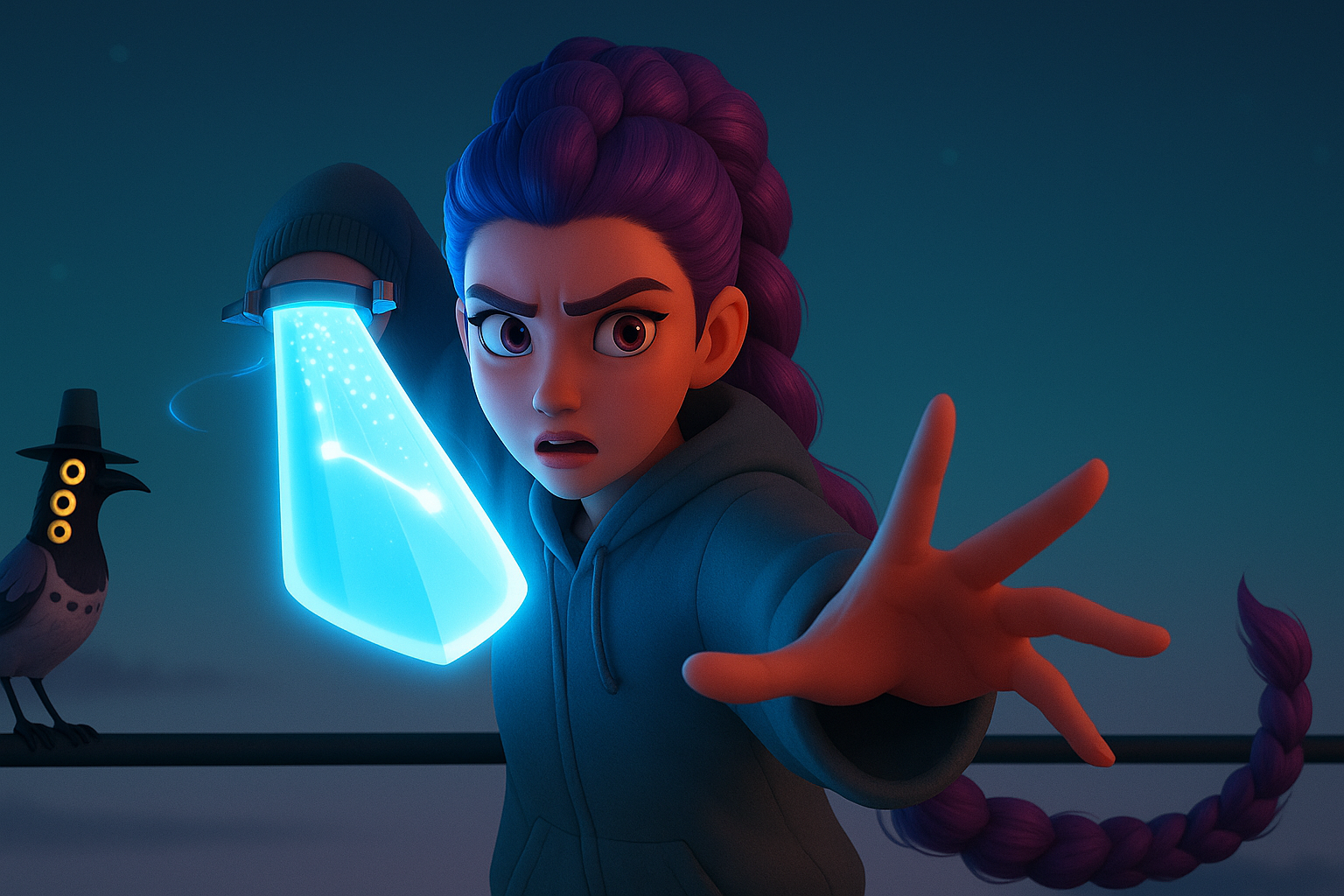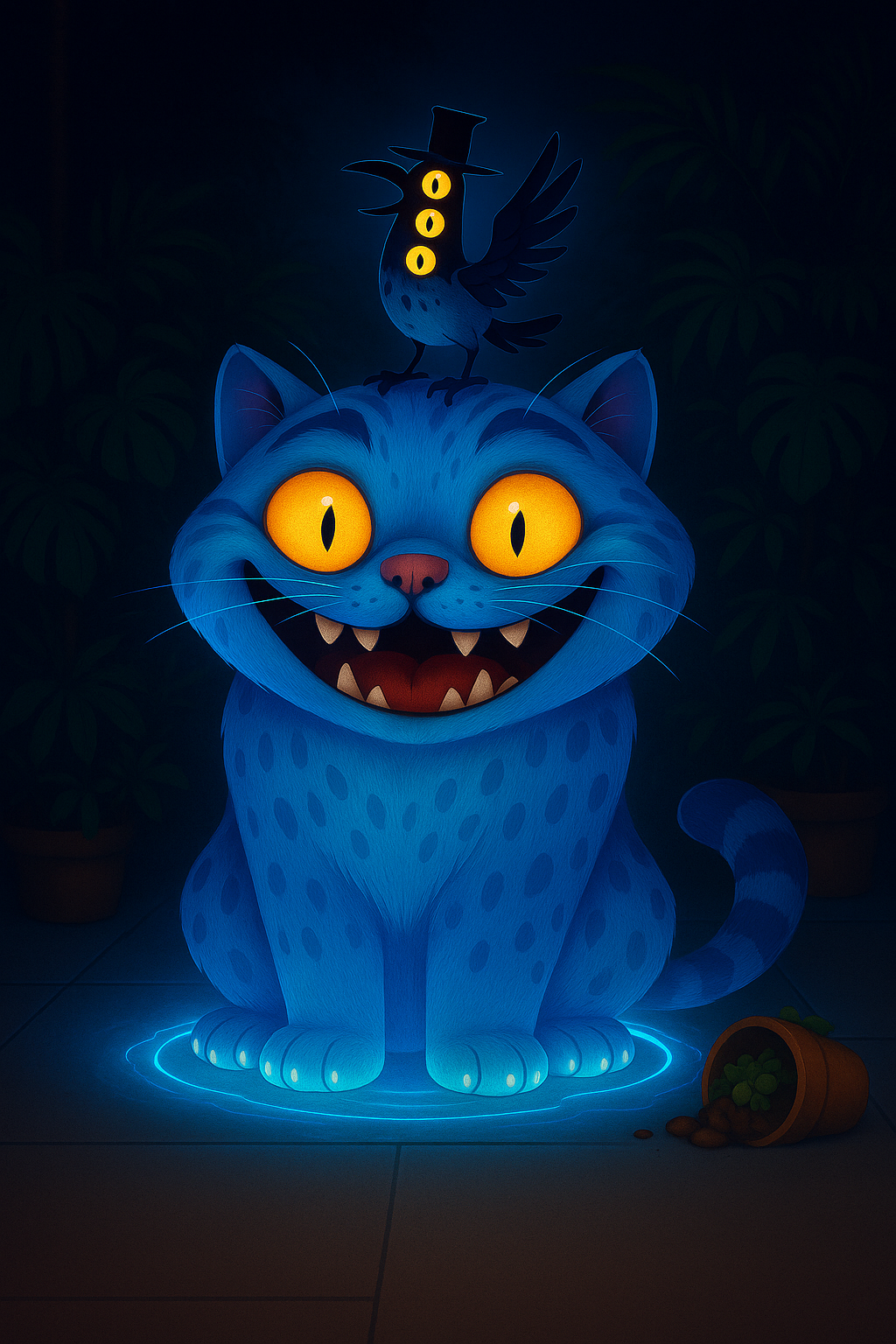Mental Health Tips from an Unlikely Source: K-Pop Demon Hunters
⚠️ Need a heads-up? This post takes about 6 minutes to read silently (or 11-12 aloud).
therapy hits different when it has choreography, a soul sword, and a derpy tiger.
I’m an almost-40 therapist and mom and surprisingly enough, I found myself binge-watching “K-pop Demon Hunters” … over and over again. My daughters kept watching it on their own, and on a whim one night while I was in total doomscroll mode, I told my 11-year-old to just turn on something she likes and I won’t lie, it sucked me in. I don’t even want to tell y’all how many times I have watched this movie now!
The animation is unique, colorful, often hilariously exaggerated (literally made me lol), and just plain gorgeous. Every song is a total bop, that final song in particular gives me goosebumps everytime I watch it.
And of course, the honorable mention of the derpy ass tiger that just gives giant stupid housecat vibes. If you know me, you know good and well I love an injection of humor! Somewhere between the beat drops and the demon battles, I realized… to an average viewer or skeptic, this movie might seem silly on the surface, but emotionally? It slaps so hard.
But! the point of this post isn’t just to sing the praises of the pretty-and-cute-and-funniness of this movie, it’s to point out that there are genuinely awesome messages about mental health, identity, masking, love, and trauma, so let’s get into it…
(SPOILERS!)
Here are 7 things K-Pop Demon Hunters can teach us about healing, identity, and becoming yourself
1. You Can’t Heal If You're Still Pretending
Theme: Dual identity, masking
Scene: Rumi hiding her “patterns” from everyone, even her closest confidants.
Lyric: “I lived two lives, tried to play both sides, But I couldn’t find my own place.”
Therapy truth: A life split between “who they expect me to be” and “who I actually am” isn’t sustainable. At some point, you have to stop auditioning and come home to yourself.
Bonus lyric:
“I was a ghost, I was alone
어두워진 앞길속에 (darkened/gloomy, in the road ahead)
Given the throne, I didn’t know how to believe
I was the queen that I’m meant to be.”
Even when we’re handed visibility or influence, it means nothing if we’re still haunted inside. Real empowerment doesn’t come from approval, Idol Awards or ratings, it comes from integration of all parts of yourself, even the ones that you fear.
2. Found Family Is Sacred
Theme: Chosen belonging, Trust, Authenticity
Scene: Huntr/x reconciling after the Idol Awards betrayal, and coming together to defeat Gwi-Ma.
When Rumi finally got real and honest about what she is (a half hunter/half demon), and sang from her truth, The first people to notice her were Mira & Zoey, her Found Family. They heard her singing out over the Saja Boys hypnotic performance. They felt her rawness and reconnected with her. Even though her half-demon nature challenged their beliefs, they could see her shame and pain, and knew it wasn’t as “black and white” as they might have thought.
Therapy truth: Healing happens faster when you’re not doing it alone. Whether it’s your goofy little group chat or a surrogate sisterhood of glowing soul weapon-toting bad bitches.
After the initial shock, Mira and Zoey came to realize that she is the same Rumi she has always been, even with her “patterns” and complicated past.
There were a few times that Rumi could have told the other girls her secret when they were exposing their own insecurities, but it seems she feels hers was too difficult or dangerous to be honest about. Are you doing the same thing and hiding yourself from your people? It might be time to challenge that and seize the opportunity the next time it presents itself!
3. Name It to Tame It: Shame Needs Light
Theme: Inner work, Shame, Trust
Scene: Celine (Rumi’s mother’s friend who raised and trained the girls from Huntr/x) had always taught Rumi, Mira and Zoey to hide who they really are. Even instilling a mantra they were to repeat. She wanted them to present as polished and perfect. Celine knows that Rumi’s nature isn’t “black and white”; she even feared fully loving Rumi because of what she was. She also feared that Rumi wouldn’t be accepted if anyone knew, and promoted Rumi masking. As Rumi’s shame grew, so did her “patterns”.
Quote:
“We are hunters, voices strong.
Your faults and fears must never be seen.”
Therapy truth: More often than not, avoidance feels safer than honesty and conflict... until it starts to haunt you. Healing means turning around, locking eyes with the thing you’ve been running from, and saying, “I see you now.”
Being who you are and naming the pain is the first swing of your sword, or your glitzy demon-fighting crew, either way, you deserve people who don’t need you to explain why you are the way you are.
4. Trauma Makes Love Scary, But It’s Worth It
Theme: Trauma-informed intimacy, vulnerability, healing in relationship
Scene: Rumi and Jinu form an unlikely connection when Jinu first discovers that Rumi isn’t just a hunter, but also part demon. He covers for her with her friends, even though it would have benefitted him to out her. This connection is emotionally charged, slow-burning, and terrifyingly real. Neither of them are healed. But they see the potential and familiarity of each other and are willing to try.
Song Tie-In: “Free” their unofficial love song (and emotional gut-punch)
Lyric:
“All the damage that might make me dangerous,
You got a dark side, guess you're not the only one.
What if we both tried fighting what we're running from?
We can't fix it if we never face it.”
Therapy truth: We deserve love even if we haven’t fully healed from our pain or outgrown our darkness, so long as we love and care for each other.
Rumi and Jinu don’t wait until they’re “healed” to connect. Rumi is convinced she can heal her patterns, while Jinu is convinced he could never be healed. She sees the good in him that he can’t, and he sees the hope in her that he hasn’t had. They both showed up, bruised, scared, guarded, and tried. And that is wildly brave!
Intimacy after trauma means letting someone close while still holding your own power. It means saying: “I’m not perfect. But I’m not giving up.”
Love doesn’t have to mean saving someone. Sometimes it just means staying with your shadow and theirs, and fighting what you’re running from… together.
5. Your Weapon Grows With You
Theme: Identity, transformation
Scene: Jinu owns up to the lie he told Rumi about how he became a demon (by abandoning his mother and sister) to live a luxurious life. Later, he sacrifices himself for her and gives her his soul, transforming her sword and giving her even more power to fight Gwi-Ma. Jinu’s death is lowkey heartbreaking, but healing the rift between them that Gwi-Ma caused, perpetuated by injecting fear, shame, and doubt into Jinu was magical enough to turn the tide. It was Rumi’s faith in Jinu that changed everything.
Lyric:
“My voice without the lies, this is what it sounds like,
fearless and undefined, this is what it sounds like,
truth after all this time, our voices all combined,
this is what it sounds like”
Therapy truth: You can’t erase your past, but you just carry it differently. Healing isn’t amnesia; it’s strength without shame. It’s working through your pain and baggage and recognizing the strengths within yourself, faults and all.
As you evolve and integrate your whole self together, your defenses and identity change too. The tools you once used to survive can grow up with you. They can shift and change and advance in ways you never thought possible. Growing up is accepting that you need to always be changing and adapting.
6. Every Battle Starts Inside
Theme: Emotional channeling, projecting
Scene: At the “Takedown” rehearsal, Rumi is feeling so conflicted about singing this song, it was first written from a place of anger and hatred. But, as Rumi and Jinu got closer, she was able to see the goodness in him, despite him being a demon. She began to realize how unaligned this song was with her understanding of Jinu and her half-demon bloodline. The veil lifts for Rumi, and she realizes that singing, “A demon with no feelings don’t deserve to live, it’s so obvious” wasn’t so cut and dry anymore. This song wasn’t going to bring the people together; it was going to deepen the divide.
Therapy truth: Feelings are energies to analyze and explore, not enemies. You don’t have to be calm and self-denying to be powerful; you just have to stay present and acknowledge what is going on inside of you.
Rage, grief, joy, fear, shame, and sadness can guide you; they don’t have to swallow you.
7. Integration Is the Final Song. Spiritual AF.
Theme: Creative catharsis, post-traumatic growth, Grace
Scene: Huntr/x performs “What it Sounds Like.” This one, you guys… woah. Goosebumps every single time. Full on soul-cleanse. Rumi, Mira, and Zoey reunite and come together to sing a song that is ACTUALLY about their truth, and finding strength in their vulnerabilities and insecurities. Gwi-Ma attacks Rumi head-on and she does all she can to fight him off, until Jinu jumps in between them, demon eyes gone, and sacrifices himself to save her, and everyone else in the stadium, for that matter. In giving her his soul, Rumi, her sword, and the other two girls become more powerful and defeat Gwi-Ma with their song of truth. A surprising new Honmoon appears; not blue like before, not as gold like they had always been told it needed to be, but like a rainbow. Symbolizing there is room for more than just good and bad, it’s more complicated than that. It is self-acceptance and grace embodied.
Lyrics:
“I broke into a million pieces, and I can't go back
But now I'm seeing all the beauty in the broken glass
The scars are part of me, darkness and harmony.”
Therapy truth: This is integration and wholeness.
It’s what happens after the breakdown, when the pieces don’t go back the same way... and somehow, that’s better, even if you never thought that was possible. Art makes space for the parts of us that felt too broken, too loud, or too strange to say out loud. And when someone else sings it? You don’t feel so alone anymore.
Bonus Lesson: Healing Needs Comic Relief
Scene: Derpy the tiger struggling with the flower pot. Magpie Sussy proudly sporting his stolen hat.
Therapy truth: Not everything has to be profound. Sometimes what you need most is a goofy tiger, a sassy bird, and a flower pot on a patio.
Laughter is medicine.
Goofiness is sacred.
Joy is health.
Final Thought
Listen, I love me a self-help book, or a workbook; they are great!
But sometimes it takes an animated, magical analogy to really hit home with the truths you know deep down:
You don’t need to hide, you need to integrate all the parts of yourself you have rejected and find a new truth about yourself.
Ain’t nothin’ wrong with getting that truth alongside a bangin’ soundtrack, a soul sword, a trip to the bath house (or spa), and a derpy tiger reminding you it’s okay to laugh in the middle of the chaos.
because
K-Pop Demon Hunter therapy Hits different.
Got a favorite show or movie with hidden therapeutic gold?
I’m always on the lookout for stories that dig deep, spark insight, or hit you right in the healing feels. If there’s a character arc, theme, or scene that made you think “Wait… this is basically therapy,” I want to know about it! Drop your suggestions in the comments or shoot me an email, I might feature it in a future post!





